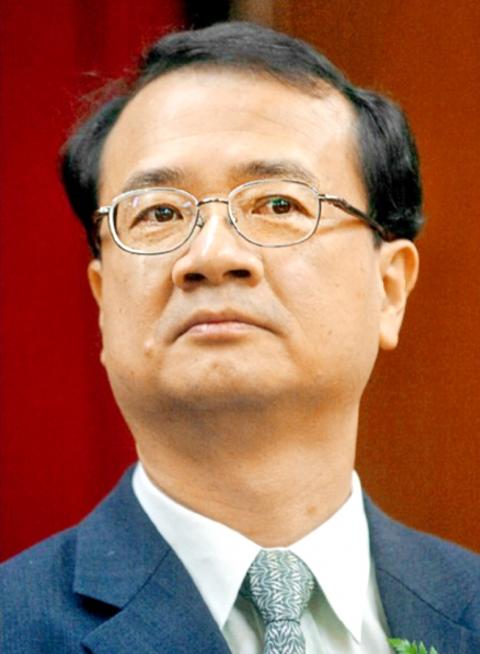Legal experts yesterday said that the Constitution bars former grand justice Hsu Tzong-li (許宗力) from heading the Judicial Yuan, following reports that President Tsai Ing-wen (蔡英文) was considering nominating him for the position.
National Taiwan University professor of law Chen Chih-lung (陳志龍) said that Hsu served as a grand justice from 2003 to 2011 — a mandated eight-year term — and an amendment to the Constitution prohibits an additional term.
In the Additional Articles of the Constitution, Article 5 says: “Each grand justice of the Judicial Yuan shall serve a term of eight years, independent of the order of appointment to office, and shall not serve consecutive terms. The grand justices serving as president and vice president of the Judicial Yuan shall not enjoy the guarantee of an eight-year term.”

Photo: Lo Pei-der, Taipei Times
“That article was part of an amendment to prevent grand justices from bowing to the wishes of political figures when making constitutional interpretations,” Chen said. “Hsu’s appointment to serve as a grand justice again is unconstitutional and it would be an international joke.”
The amendment says that the Judicial Yuan has 15 grand justices, while the president and vice president of the body are to be selected from among them, being “nominated and, with the consent of the Legislative Yuan, appointed by the president of the Republic” of China.
Presidential Office officials said they have consulted legal experts regarding the issue.
The appointment would be legal and there would be no breach of the Constitution in nominating Hsu, the officials said.
Hsu would be “reappointed,” not “serving consecutive terms,” which are two different concepts, they said.
Hsu was not continuing as a grand justice to serve for another term, because he retired from the post, the officials said. Academics and experts on constitutional law were consulted and they concurred that the move would not be a breach of Article 5, therefore the government will go ahead with Hsu’s nomination.
Tsai has faced a number of obstacles filling the Judicial Yuan’s presidency and No. 2 post, with her first picks, Public Functionary Disciplinary Sanction Commission Chief Commissioner Hsieh Wen-ting (謝文定) and Judicial Yuan Secretary-General Lin Chin-fang (林錦芳) withdrawing over past controversies.

CHAOS: Iranians took to the streets playing celebratory music after reports of Khamenei’s death on Saturday, while mourners also gathered in Tehran yesterday Iranian Supreme Leader Ayatollah Ali Khamenei was killed in a major attack on Iran launched by Israel and the US, throwing the future of the Islamic republic into doubt and raising the risk of regional instability. Iranian state television and the state-run IRNA news agency announced the 86-year-old’s death early yesterday. US President Donald Trump said it gave Iranians their “greatest chance” to “take back” their country. The announcements came after a joint US and Israeli aerial bombardment that targeted Iranian military and governmental sites. Trump said the “heavy and pinpoint bombing” would continue through the week or as long

TRUST: The KMT said it respected the US’ timing and considerations, and hoped it would continue to honor its commitments to helping Taiwan bolster its defenses and deterrence US President Donald Trump is delaying a multibillion-dollar arms sale to Taiwan to ensure his visit to Beijing is successful, a New York Times report said. The weapons sales package has stalled in the US Department of State, the report said, citing US officials it did not identify. The White House has told agencies not to push forward ahead of Trump’s meeting with Chinese President Xi Jinping (習近平), it said. The two last month held a phone call to discuss trade and geopolitical flashpoints ahead of the summit. Xi raised the Taiwan issue and urged the US to handle arms sales to

State-run CPC Corp, Taiwan (CPC, 台灣中油) yesterday said that it had confirmed on Saturday night with its liquefied natural gas (LNG) and crude oil suppliers that shipments are proceeding as scheduled and that domestic supplies remain unaffected. The CPC yesterday announced the gasoline and diesel prices will rise by NT$0.2 and NT$0.4 per liter, respectively, starting Monday, citing Middle East tensions and blizzards in the eastern United States. CPC also iterated it has been reducing the proportion of crude oil imports from the Middle East and diversifying its supply sources in the past few years in response to geopolitical risks, expanding

Pro-democracy media tycoon Jimmy Lai’s (黎智英) fraud conviction and prison sentence were yesterday overturned by a Hong Kong court, in a surprise legal decision that comes soon after Lai was jailed for 20 years on a separate national security charge. Judges Jeremy Poon (潘兆初), Anthea Pang (彭寶琴) and Derek Pang (彭偉昌) said in the judgement that they allowed the appeal from Lai, and another defendant in the case, to proceed, as a lower court judge had “erred.” “The Court of Appeal gave them leave to appeal against their conviction, allowed their appeals, quashed the convictions and set aside the sentences,” the judges